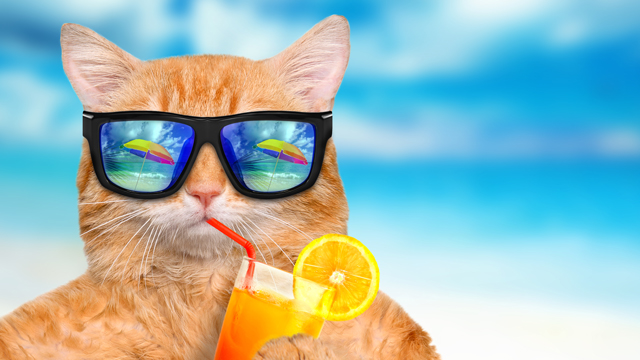There’s so much to do in RVA, and Richmonders don’t let the season’s heat and humidity slow us down. From the many outdoor festivals to a stroll around Carytown or by the James River, we’re out and about, enjoying our city – and who better to join us playing outdoors than our pets?
Although pets need their exercise, we must be very mindful about overheating. Our dogs may not stop playing until we do, even if they are about to collapse from the heat. We’ve all seen goofy Labs and golden retrievers chasing a ball until the end of time! Heat stroke can happen fast in our climate.
When the weather starts heating up, my friends know they will soon read my warnings on social media. I can’t help it. Heat stroke
is an extremely serious, often fatal, condition. That’s why I always say: The best cure for heat stroke is to not get heat stroke.
Since people are better at cooling themselves than pets are, many pet parents don’t realize the danger. Although pets do have some sweat glands in their paws (which is why wading in cool water is such a great activity), dogs and cats can’t maintain their temperature like people do. The main way dogs cool off is by panting. But on hot, humid days, dogs are taking in hot, humid air – not very cooling! Cats may pant also, trying to cool off as saliva evaporates from their tongue, but they face the same problem. There’s just not much evaporation happening when pets are surrounded by humid air.
And it isn’t just our large, rambunctious pets who are at risk. The brachycephalic breeds – or dogs with smooshed faces like pugs, Pekingese, and boxers, to name a few – may have breathing issues normally, and being overheated makes this worse. Overweight pets are also more susceptible to the heat, as are cats, and any pet who spends long stretches of time outside.
I’ve seen dogs come to the ER with temperatures of 109 degrees or higher (normal for a dog or cat is around 101 to 102). Pets with heat stroke may collapse, go into shock, develop blood clotting problems, as well as suffer liver, kidney, and GI tract damage. Treatment is far more complex than merely giving fluids. It can require many medications, blood/plasma transfusions, even dialysis. And sadly, even after all this – and many days in the animal hospital – not every pet will get to go home.
As summer days heat up, familiarize yourself with the signs your cat or dog may be suffering from the heat:
• Rapid panting, sweaty feet, drooling
• Excessive grooming (in cats)
• Rapid pulse and breathing
• Redness of the tongue and mouth
• Vomiting
• Lethargy
• Stumbling, staggering gait
If your pet is just starting to show signs of distress from the heat, quickly get her to a cool place and offer lots of water to drink. If you think she is suffering from heat exhaustion or heat stroke, there are a few quick steps you can take to start the cooling process before you rush to a veterinary hospital. First, move the pet to a cool area. Next, wet the skin with cool water. Avoid freezing water or ice. This can cause blood vessels to constrict, actually slowing the cooling process. Plus, ice can damage your pet’s skin. Don’t spend too much time trying to help your pet at home before you head to the veterinarian’s office. Every minute is critical when animals are suffering from
heat stroke.
7 Fun-in-the-Sun Tips for Pets
Make summertime fun for you and your pet with these activities:
• Hose down your dog in the backyard, play under the sprinkler, or give a cool bath.
• Go swimming.
• Wade in a kiddie pool.
• Take walks in the early morning,
not afternoon.
• Walk on grassy areas, not hot pavement.
• Enjoy a summer snack together! Dogs love watermelon (remove the seeds and don’t give the rind) and popsicles. Dogs love ice cream, too, but don’t share yours. Make a dog-friendly treat using ingredients like yogurt and peanut butter, or buy the just-for-dogs version at the grocery store.
• And it’s always okay to just hang out inside in the air conditioning. Watch a movie together (dogs love unbuttered popcorn!), play an indoor game of ball or fetch, or just take a nap. You can get outside and romp when evening comes!




